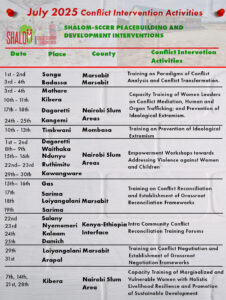By: Godfrey Okoth MA & Francis Mwangi MA
Manifest violent extremism is on the rise globally, an escalating threat to sustainable peace, human security, among other issues. In recognition of the problem within their region, the Association of Member Episcopal Conferences of Eastern Africa (AMECEA) recognized the need for an immediate collaborative intervention to prevent and counter the dangers. Rev. Dr. Devine, the Shalom-SCCRR International Chairman had presented a paper on the issue of religious ideological extremism at the AMECEA 19th Plenary Assembly, at the United Nations conference center in Addis Ababa, Ethiopia (https://shalomconflictcenter.org/conflict-transformation-radicalization-and-extremism-in-eastern-africa/). A resolution was adopted by AMECEA to pro-actively address the problem of religious ideological extremism. Shalom-SCCRR has a signed Memorandum of Understanding (MoU) with AMECEA to coordinate efforts and enhance collaboration and cooperation in advancing their shared objectives in the service of African communities in the AMECEA region through conflict resolution and peacebuilding processes. In view of the present need, AMECEA invited Shalom-SCCRR to present an analytical and transformative methodology for addressing religious ideological extremism in Eastern Africa. This led to a forum attended by some invited strategic personnel from the affected areas along the Eastern Africa Coastal strip, and its environs. Among the participants were Archbishop Martin Kivuva Musonde of Kenya’s Mombasa Archdiocese, Bishop Willybard Kitogho Lagho of Malindi Diocese, Kenya, Bishop Montfort Stima of Mangochi Diocese, Malawi, and Bishop Titus Joseph Mdoe of Mtwara Diocese, Tanzania.
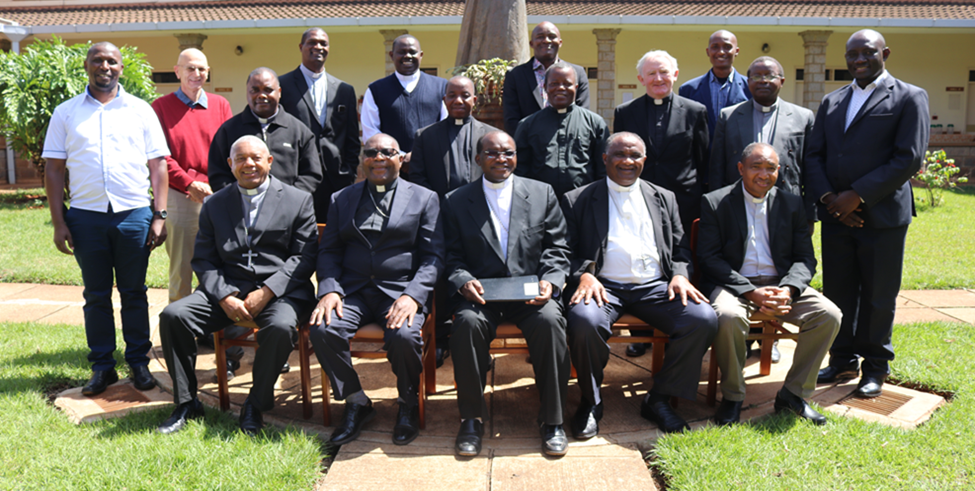
The Shalom team was led by Rev. Dr. Patrick Devine, Shalom-SCCRR International Chairman, Fr. Oliver Noonan MA, Executive Director, Mr. Godfrey Okoth MA, Senior Project Officer, and Mr. Francis Mwangi MA, Monitoring, Evaluation, Research and Learning Officer.
Very Rev. Fr. Antony Makunde, Secretary-General of the AMECEA, opened the forum. He highlighted some of the key challenges posed by religious ideological extremism affecting dioceses in Eastern Africa, such as the loss of human life, maiming, disruptions on activities of mission work, destruction of infrastructure, communities living in fear of violent attacks.
Rev. Dr. Patrick Devine shared one of his published papers with the participants on “Radicalization and Extremism in Eastern Africa; Drivers and Dynamics” (http://mural.maynoothuniversity.ie/9086/7/PD-Radicalisation-2017.pdf). In his presentation, he expounded on the causes, drivers, process, and dynamics, along the Tolerance-Terrorism continuum. This entailed scrutinizing the negative radicalization regressions that lead to fundamentalism, to non-violent extremism, and eventually to manifest violent extremism operationalized in terroristic acts (https://shalomconflictcenter.org/shalom-sccrr-deliberates-on-its-interventions-to-counter-and-transform-radicalisation-and-extremism-in-eastern-africa/).
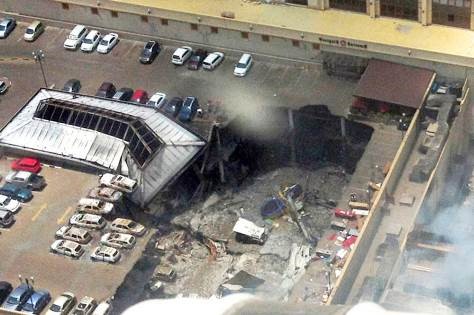
Mr. Godfrey Okoth presented a very comprehensive methodology titled, “Preventing and Transforming Radicalization, Religious Ideological Extremism, and Terrorism in Eastern Africa; Methodology for Achieving Tolerance, Inclusivity, and Positive Peace”. The input included among other pertinent issues a section on how empirical research – that is participatory in approach -informs Shalom-SCCRR methodology of intervention (https://shalomconflictcenter.org/inter-religious-intolerance-shalom-sccrr-interventions-2/).
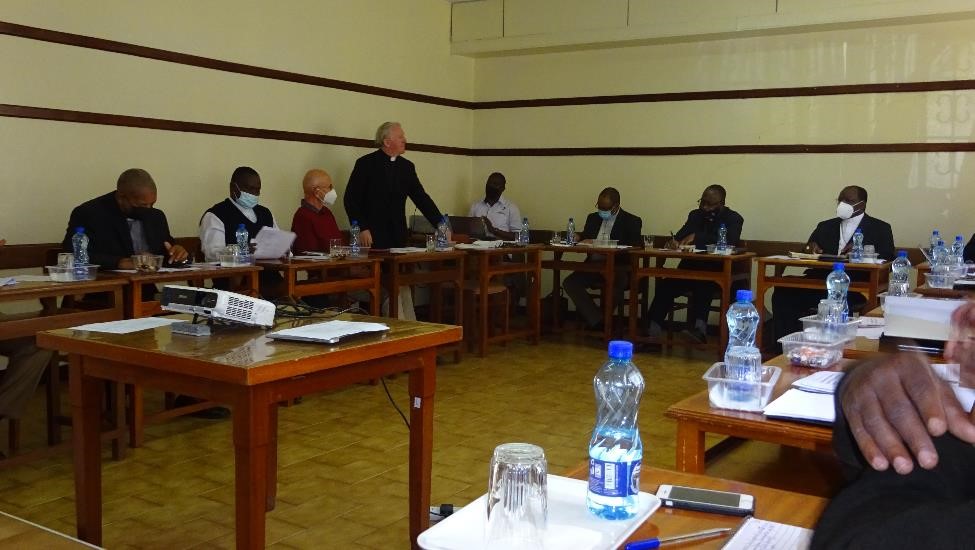
Rationale for Interventions against Violent Extremism in Eastern Africa; A Shalom-SCCRR position
Based on its vision, mission, core values, and objectives, Shalom-SCCRR has developed a multi-dimensional conflict intervention strategy to contribute significantly in the prevention and transformation of human rights injustices caused by religious ideological extremism. Thus, the Universal Declaration of Human Rights adopted by the United Nations (UN) also underpins, guides and inspires the organization’s intervention methodology.
Rev. Dr. Patrick Devine, in his presentation observed that, “from the standpoint of the humanitarian / peace/development nexus, in conflict environments where people are killed, maimed and displaced persistently, it is extremely difficult, if at all possible, for social and religious values of peace, truth, justice and mercy to take deep communal root; “these values are of utmost importance for people to live normal lives aspiring to the fullness of sustainable peace, development and reconciliation,” he noted. He also mentioned that during his presentation at the AMECEA Plenary at the UN Conference center in Addis Ababa, that brought together about 100 bishops from 10 countries in Eastern and Horn of Africa, “there was urgent need for religious leaders/seminarians/lay faithful to have greater exposure and proficiency in the areas of Peace Studies, Conflict Transformation, Comparative Religion and International relations. He again challenged “International Catholic Development Agencies to be more pro-active in sponsoring a minimum of MA scholarships for priests, nuns, lay people in the aforementioned fields of study, especially for dioceses and locations experiencing ongoing inter-ethnic conflicts and religious ideological extremism within their territories”.
Rev. Dr. Patrick placed emphasis on the value of research and credibility of institutions involved in research undertakings. Shalom-SCCRR empirical research is recognized nationally, regionally and internationally as conducted to the highest academic research standards and rigour. The findings are the authoritative voice of the people among other critical dimensions. “Our research studies engage the three analytical paradigms of Realism (Strategism), Structuralism (Peace Research), and Conflict Research. Through research, the organization continually updates its stock of knowledge with regard to the changing trends of conflicts and consequently adjust its intervention strategies in program areas.” In his conclusion, he noted that, “Shalom-SCCRR multi-dimensional strategy/approach ultimately aims to transform individuals, communities, and states to a mindset of tolerance and inclusivity, where joint inter-communal and interreligious development can take place and coexistence can be realized.”
Context Issues relating to Violent Extremism
Archdiocese of Mombasa and Diocese of Malindi
Mombasa and Malindi are located in the coastal region of Kenya along the shore line of the Indian Ocean. Among the issues that emerged as presented from the two dioceses were:
- Deadly violent conflict incidences in recent years in which security personnel have been targeted, civilians injured and killed, shops burned and religious institutions attacked and looted. Some of the horrifying incidences reported are: West Gate Mall shooting (67 Killed), Garissa University College (147 killed — of which 61 students were decapitated and 86 had their throats cut (https://shalomconflictcenter.org/shalom-center-stands-with-kenya-and-the-path-to-peace/), Mpeketoni attacks in Lamu County (more than 60 people killed);
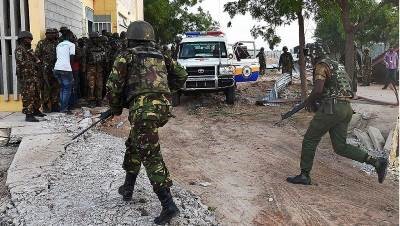
- Most of the reported violent incidences have been associated with radicalization and violent extremism that appears to be driven by religious and political ideologies, economic grievances and historical injustices;
- Land access/ownership/use significantly contribute to intercommunal violent conflict;
- Unemployment among youth is a major driver to radicalization and into violent extremism; and A sizeable portion of youth who are well-educated and unemployed have been easy targets for recruitment by extremist groups.
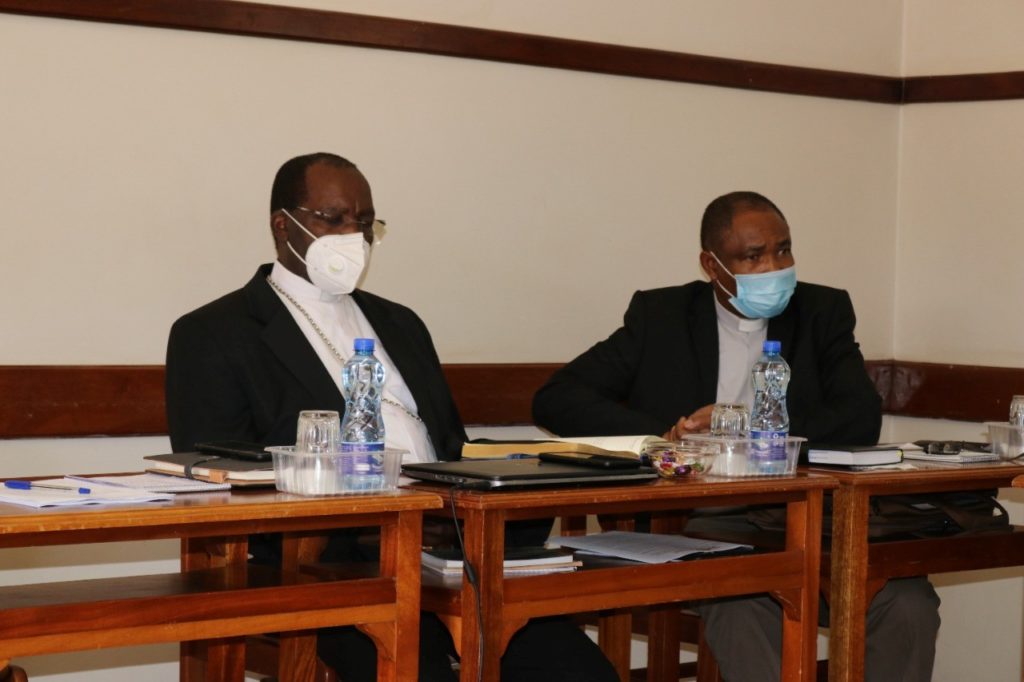
His Grace, Archbishop Martin Kivuva noted that the Archdiocese of Mombasa was engaging religious and spiritual leaders from other faiths, religions, and traditions through dialogue that involved promoting understanding between them to increase mutual tolerance of other people’s religious/spiritual orientation leading to peaceful coexistence.
“Much more needs to be done but there is lack of capacity in terms of resources and the required skills. We are inviting Shalom-SCCRR to Mombasa to augment our efforts. They bring with them a team of experts and experience in research, conflict transformation, peacebuilding, and development,” noted the Archbishop.
Rt. Rev. Bishop Lagho of Malindi Diocese expressed the need to fully utilize the benefits of research in better understanding the roots causes of religious ideological extremism and in developing effective interventions for and with the affected communities.
Malawi: Diocese of Mangochi
Diocese of Mangochi is located at the southern region of Malawi. The predominant religion in the region is Islam followed by Christianity. In the recent past, the diocese has reported an increase in interreligious conflicts manifesting as follows:
- Rt. Rev. Montfort Stima, Bishop of the Catholic Diocese of Mangochi observed with great concern the increase in conflicts based on religious affiliations, a situation that is hampering religious activities at a significant level;
- Conflict over dress codes in schools for female students (whether to allow the wearing of hijabs or not within educational facilities that are associated with Christianity);
- Conflicting opinion on the religious curriculum to be taught in schools; and
- Contestations over the ownership and management of religious affiliated learning institutions.
“Shalom-SCCRR approach in conflict transformation and peacebuilding, schools/educational development, peace education, is what we need in Mangochi diocese and the larger Malawi. In this context, education that fosters inclusivity will be key in building young people’s resilience against violent extremist influence, while at the same time developing their sense of identity and belonging,” suggested Fr. Lazarus from the diocese of Mangochi in Malawi.
Tanzania: Diocese of Mtwara
Catholic Diocese of Mtwara is located in South-Eastern Tanzania. It borders Mozambique to the south and the Indian Ocean to the East. Mtwara features a deep-water port which makes it favorable for big container ships to berth there. Being a natural harbor that has been recently expanded, its significance and potential has rapidly increased the facilitation of cargo transport to Lindi, Ruvuma regions and other Southern African Development Community (SADC) states. The conflict issues highlighted as a result of the changing economic and demographic landscape of Mtwara were:
- Vested interests in natural resource projects such as the Gas project which led to violent conflict in the area;
- Local community over-expectations;
- Claims of inadequate community participation in the ongoing projects and low benefits from the gas project; and
- Terrorism coming from across international borders within Eastern African region and further afield.
These situations, perceptions, and claims provide an environment that is vulnerable to manipulation by extremists.
“The insecurity and instability experienced in Mtwara has substantially affected pastoral work, especially along the border with Mozambique.” Bishop Titus Mdoe, observed. In spite of these challenges, he commended the ongoing “government efforts towards restoring peace and prosperity in the region”.
Fr. Dunstan Mbano says, “We need Shalom-SCCRR in Mtwara. We have asked the Shalom leadership to send us a team of experts to assist in conducting conflict analysis so as to establish the underlying causes of these conflicts, and thereafter develop a design for conflict intervention.”
“There is a serious lack of capacity for inter-community engagement among conflicting communities and groups. This does affect their ability to work together towards agreeing on and jointly addressing the problems that aggravate conflict between them. Skills and techniques of conducting problem-solving workshops as presented by Shalom-SCCRR provides a necessary framework for advancing long-term interreligious and intercommunal collaboration for addressing challenges such as the religious ideological violent extremism,” observed Fr. Mbano.
A Presentation: Shalom-SCCRR Intervention Methodology
Shalom-SCCRR’s methodology introduced the forum participants to skills of community entry, insertion conversations, participatory action research as a basis for analysis and local joint interventions design, problem solving workshops and joint development action plans.
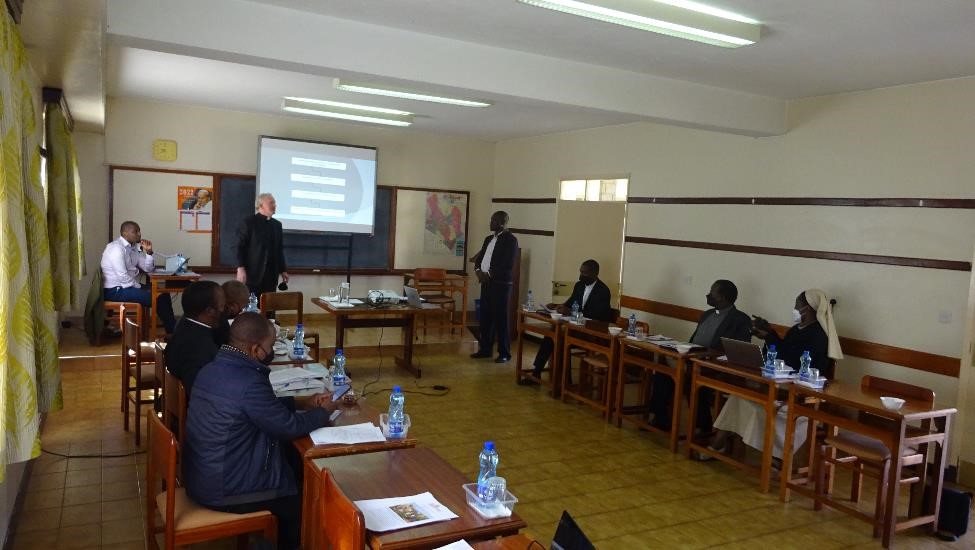
In order to build trust with the target community, establish the extent of the problem and obtain security assurance for the practitioners, Shalom-SCCRR emphasized on the importance of community entry as the starting point of its robust methodology. Consultations with relevant state security administrations, developing relationships with influential opinion shapers and attentive and sensitive listening to their perceptions, observations, concerns, and suggested interventions is central to a successful engagement.
Shalom-SCCRR further underscored the great importance of anchoring peacebuilding interventions on empirical research done to the highest academic standards and validated by the engaged local communities. Research adds value to the identification of the underlying causes in order to carefully disregard rumors, conjecture, propaganda and wrong information that can be used in fueling the conflict.
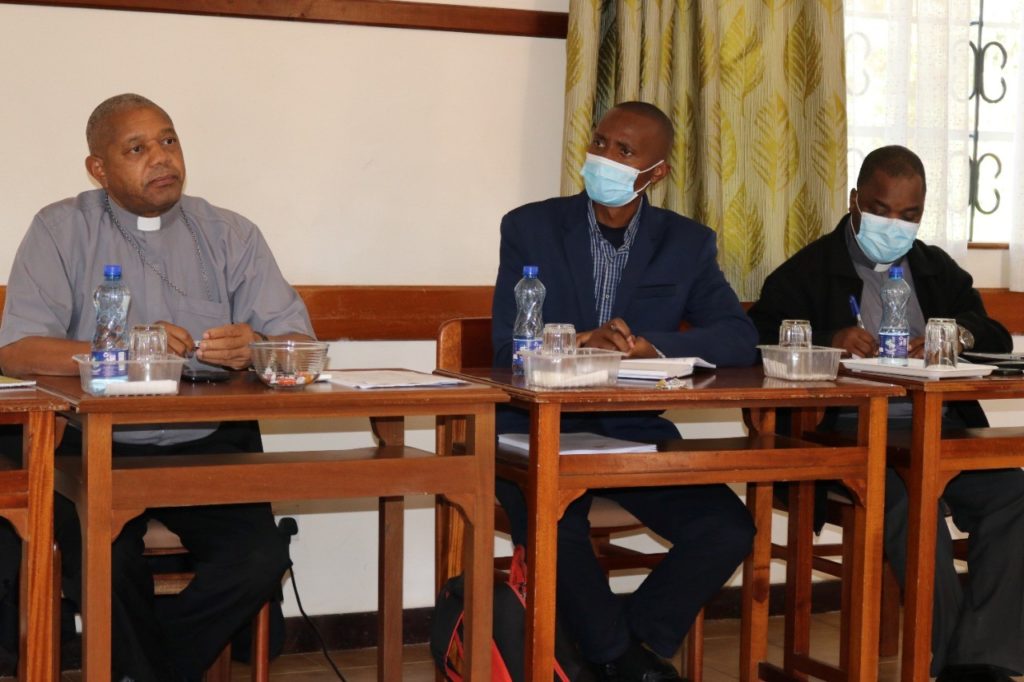
A participatory approach to our research studies, has empowered local communities in terms of knowledge and key analytical skills necessary for identifying conflict causal factors and dynamics. This increases their capacity in designing interventions that they associate with and that are locally sustained. Rigorous research will provide a better understanding of the contextual drivers leading to radicalization into religious violent extremism and inform interventions that will be conflict sensitive to realities on the ground.
As a follow up to research, Shalom-SCCRR emphasized on its support to communities to rebuild relationships that have been fractured. This is done through careful stakeholder analysis, identification of relevant personnel to initially facilitate the structuring of local community influential opinion shapers in readiness for capacity building processes. The established team of opinion shapers are then equipped with analytical skills, conflict transformation processes, peace-building techniques, as a forerunner to problem solving workshops where interdependent reconciliation rudiments and joint action plans for sustainable development are activated. It is in the problem-solving workshops that reconciliation, institutional arrangements and action plans for a sustained shared future of interdependent co-existence are agreed on.
Other than building the capacities of community leaders, Shalom-SCCRR noted with high regard the need to invest in formal education as a basis for inculcating the culture of peace among the younger generation who are mostly vulnerable to recruitment into violent extremism. To support this goal, Shalom-SCCRR emphasized on the development of learning institutions in order to improve students’ learning environments, increase accessibility to quality education, raise academic performance and foster peace and unity among interreligious and interethnic student populations through peace education syllabus.
In his presentation, Godfrey Okoth observed that Shalom-SCCRR’s methodology has been actively implemented for the past 12 years among conflicting communities across East Africa and thus is a well-tested and validated model for Conflict Transformation among conflicting groups. He further observed that between 2010-2020, Shalom-SCCRR, through this unique methodology had achieved very significant results. “In this period, we managed to conduct 695 conflict transformation and peacebuilding training workshops in 28 conflict zones. We completed 493 school/educational development projects in 263 institutions. These projects have had huge transformative impact on communities that were affected by years of violent inter-communal conflict and are marginalized from the mainstream socio-economic and development and political participation. Through our schools/educational development projects, more than 155,790 boys and girls have been empowered.”
‘Theory without Practice is Empty and Practice without Theory is Blind’ are perspectives embedded in Shalom-SCCRR’s methodology of conflict intervention, transformation, peace building and social development projects.
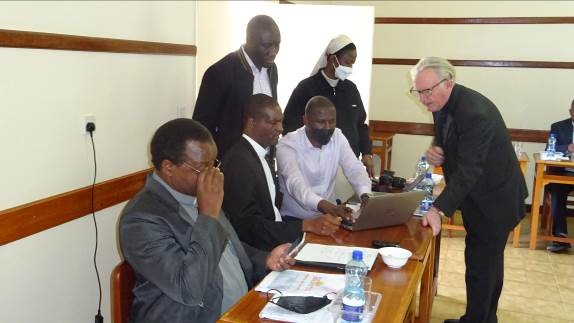
Noting the professionalism of Shalom-SCCRR in conflict transformation, peacebuilding and education infrastructural development and the importance of its unique methodology, the forum incorporated the following as part of the recommendations due for presentation at the AMECEA plenary assembly scheduled for July, 2022:
- Capacity building of influential community opinion shapers, government administrators, religious leaders and other local peace actors with conflict analytical skills based on the three conflict paradigms;
- Empowering the key peace actors with conflict transformation techniques to enable them address issues manifesting at the five levels; personal, relational, structural, cultural and religious;
- Mobilizing key opinion shapers for joint peacebuilding and development initiatives through problem solving workshops oriented to reconciliation and joint development projects.
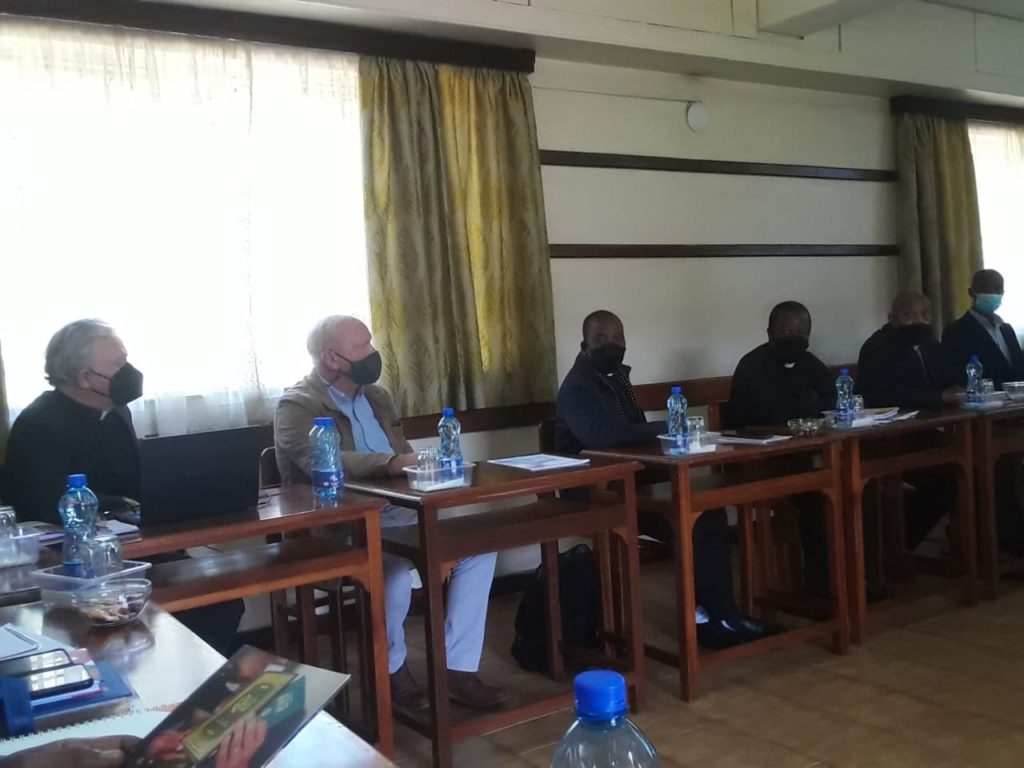
As a follow-up to the recommendations of the forum, Rev. Oliver Noonan MA, Shalom-SCCRR Executive Director (second from left) held initial planning meetings with the Archbishop of Mombasa, Most Rev. Martin Kivuva and Bishop Lagho of the diocese of Malindi to arrange dates and approaches for interventions. Further meetings on interventions will follow with the diocese of Mtwara in Tanzania and Mangochi diocese in Malawi. Fr. Oliver emphasized on the need for a collaborative approach that would ensure the participation of all stakeholders at the grassroots, as a basis for overcoming the dire consequences of religious ideological extremism. Everyone was conscious of the dangers involved in this process and the sensitivities required.
CONCLUDING REMARKS
The Archbishop of Mombasa, His Grace, Martin Kivuva, acknowledged the uniqueness of Shalom-SCCRR’s methodology especially its focus on conflict analytical skills, community empowerment through conflict transformation and the value of engaging communities in joint problem-solving interventions. He further observed that the methodology was practical for engaging the affected local communities where issues of radicalization pose the biggest threat to tolerance and coexistence.
In conclusion, the bishops reiterated with urgency the need for the peacebuilding and development methodology as presented by Shalom-SCCRR in the various dioceses represented. They assured their utmost resolve in working with Shalom-SCCRR to boost support for conflict transformation, peacebuilding and development initiatives in some of the poorest and marginalized areas that had and were still experiencing the devastating effects of religious ideological extremism and intercommunal violent conflicts.
Reported By:
Godfrey Okoth MA, Shalom-SCCRR Senior Project Officer
Francis Mwangi MA, Shalom-SCCRR Monitoring Evaluation Research and Learning Officer
CONNECT WITH SHALOM-SCCRR

